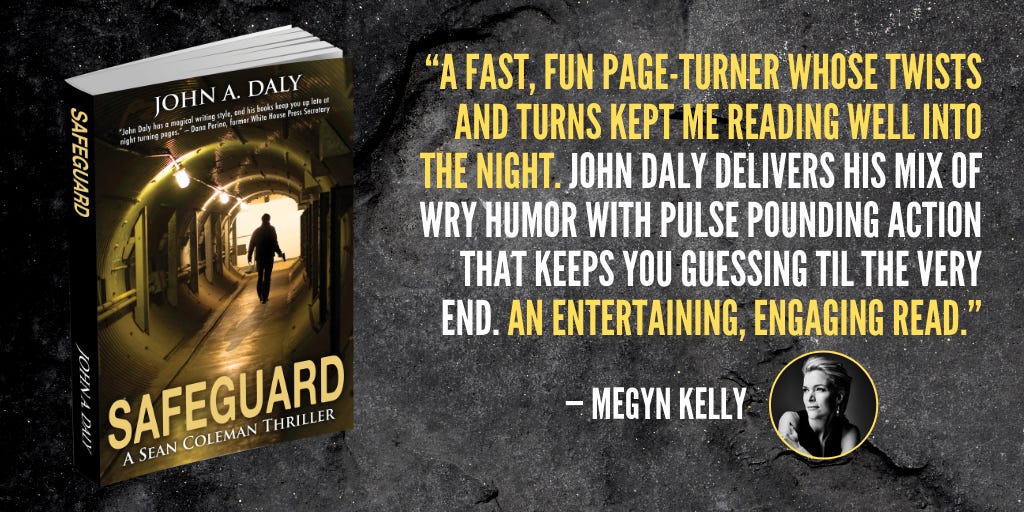
It’s been one of those weeks where all kinds of disheartening stories have leapt, in rapid succession, to the front of the national news cycle. Included have been acts of police brutality, rioting and looting that are destroying people’s lives and livelihoods, and multiple counts of shameless political theater put on by our "leaders" in government (as everything burns to the ground behind them). And oh yeah, did you forget about that global pandemic that's still going on?
In other words, there are plenty of topics for a political columnist to delve into. But frankly, it’s been a trying week for me personally, topped off by my elderly parents getting into a car accident up in the mountains the other day. Don’t worry, they're okay other than some scrapes and soreness (thank God), but I've had a tough time focusing on writing this week. So, today, instead of getting into a terribly serious topic, I figured I’d wrap up some thoughts I'd been jotting down on a strain of today’s political discourse that I’ve been seeing more and more examples lately.
I'll begin... with a metaphor.
One of my all-time favorite television shows is NYPD Blue. The 1990's police drama was edgy, extremely well written and acted, and well ahead of its time. Those who’ve read my novels may have even picked up on some influences from the show.
There’s a particular episode I sometimes think about when observing today’s political debates. It guest-starred actor Zack Ward. Ward’s name wouldn't ring a bell for most people, but you’ve almost assuredly seen (and enjoyed) at least a little bit of his work. As a youngster, he played the red-haired, raccoon-hat wearing school bully who torments Ralphie and his friends in the film classic, A Christmas Story.
In NYPD Blue, a grown-up Ward portrays a not-so-bright guy named Jerry. In the episode, Jerry gets upset with a buddy of his named Howie over an unpaid debt. Specifically, Howie lost a bet to him and didn’t pay up. The bet was over how long Howie’s petite girlfriend could last inside one of those big laundromat dryers… while it’s running.
Howie’s a real catch, ladies.
Anyway, the girlfriend didn’t hold up as well as Howie had hoped. After just a couple minutes, she could no longer bear the heat and her body being tossed around in circles. She demanded to be let out, and the contest ended. Howie lost. But again, he refused to settle up with Jerry.
Well, this ticked off Jerry — so much that he quickly went home, grabbed his gun, returned to the laundromat, and fired a shot at Howie. Only, the bullet missed Howie and hit someone else inside the laundromat… who ended up dying from the wound.
It wasn’t a great day for anyone, when you think about it. And everyone involved in the incident fled the scene… Well, everyone except the girlfriend who was still too dizzy and sick to pull off an effective getaway.
Enter pop-culture icon Andy Sipowicz (played by the great Dennis Franz). Once he and other Precinct 15 detectives figured out what had happened (the girlfriend wasn't particularly helpful), they snatched up Jerry and brought him down to the station to be interrogated. To their surprise, Jerry was pretty upfront about what happened. Only, according to him, there was a much bigger fish to fry than the issue of a dead man on a laundromat floor.
Jerry said that the man detectives should really be looking at was Howie. After all, Howie was the guy who “welshed” on the bet, and put the entire series of events in motion. So it was Howie, not Jerry, who should be going to prison.
To be clear, Jerry’s defense wasn’t just some lame, Hail Mary pass to save his own rear. He genuinely believed that he was making a compelling point, that he was in the right, and that the detectives — once they understood that details — would kick him loose.
Jerry clearly didn’t appreciate the magnitude of the situation he was in, nor the glaring asymmetry in his argument. To him, the key issue everyone should have been focused on was the monetary debt that hadn’t been paid. Even after Jerry was arrested for murder, and was being taken away, he spotted Howie at the police station and scolded him for being a welsher.
Needless to say, Jerry’s reasoning was absurd (albeit entertaining). It was indicative of an individual who lacks moral perspective, and has a very warped sense of societal accountability.
But I’m not convinced that would be the general take among observers in the realm of today’s politics. Because, truth be told, Jerry is actually quite representative of our political discourse, whether it be on cable-news, the Internet, or even in casual discussion.
Whenever there’s a controversial, incontrovertible issue or incident that draws national headlines and challenges (or reflects poorly on) the inclinations of a political tribe, a certain defense mechanism kicks in. Members of that tribe quickly focus on some minute detail of the story, and accept and promote it not only as the conclusive takeaway, but also as a wholesale discrediting of the larger controversy.
We saw this a few weeks ago when President Trump strongly implied that MSNBC host Joe Scarborough (non-coincidentally a prominent Trump critic) murdered a former aide. The young woman, in reality, died after fainting and hitting her head. Trump’s accusation was a big story, as it should be when a sitting president advances a thoroughly debunked conspiracy theory that desecrates the memory of an innocent woman, while bringing needless pain and suffering to her family. By any objective standard of decency, what the president did was an utter disgrace.
But no so fast… Trump defenders (including the White House Press Secretary, Kayleigh McEnany) latched onto an old radio interview Scarborough did with Don Imus. It took place a couple years after the aide’s untimely death. In the last few seconds of that interview (which was lighthearted and jovial), Imus — a shock jock — said something shocking. He made a distasteful joke about Scarborough sleeping with an intern and then killing her. Scarborough laughed off the comment, and kind of rolled with it as the interview ended.
Somehow, in the minds of the Trump faithful, this hurried, seconds-long exchange from 17 years ago became the real story. As far as they were concerned, it not only negated Trump’s controversial statements and put the burden on Scarborough to have to answer for his insensitivity, but even bolstered Trump’s case that police investigators should be looking into Scarborough.
We saw something similar just a few days ago, after Trump’s widely panned photo-op in front St. John's Episcopal Church. Protesters were cleared out of the area beforehand by U.S. Park Police and Secret Service who used, by their own admission, smoke canisters and pepper balls. Then, Trump and members of his cabinet walked to the nearby church, video crew in tote, where the president posed in front of the building holding up a Bible. They all then returned to the White House where the video was edited, dubbed with dramatic music, and posted on the White House’s social media accounts.
The stunt was pretty clearly designed to convey strength following some media heckling Trump took from his critics about “hiding out” in the White House bunker the night before, when vandals from a George Floyd protest set part of the church on fire.
The real story, by any objective standard, was protesters being forcibly removed with smoke and chemicals in order for a President of the United States to, as the American Conservative’s Ron Dreher editorialized, “stand in front of a church flashing a Bible like a gang sign to get conservative Christians in line.”
Those inclined to defend Trump, however, chose to focus on a specific detail in the media’s reporting of the incident: reporters’ use of the term “tear gas” in their descriptions of how the protesters were pushed back by authorities.
Media pro-Trumpers like The Federalist’s Mollie Hemingway led the charge, insisting that tear gas was never used, and that the media was spreading "fake news." Trump himself retweeted the piece and others like it, and soon that's all anyone was talking about.
There’s just one problem: pepper spray (which the USPP admits they used on the crowd) is actually a form of tear gas (which is a colloquial term). Even if one is inclined to engage in a semantics battle over the type of eye-irritating chemical agents that were used against the crowd, that doesn’t change the fact that chemical agents were used against the crowd… to clear a path for a political photo op.
Of course, it’s not just the political right that employs this technique. But as I’ve written in the past, people on the left are far more inclined to commit an almost inverse offense: trivializing or even omitting important details of a story in order to bolster a much larger societal narrative that the facts themselves just don’t warrant. This too perverts our political discourse.
A good example came this week from NBC News and Vice News, where journalists tried to compare the killing of George Floyd to a transgender black man named Tony McDade who was shot and killed by police in Florida that same week.
The aim was clearly to shove the McDade shooting into the “Black Lives Matter” theme of police brutality, and callous police officers unjustly killing black suspects. The problem is that both outlets seriously downplayed, and in some cases entirely omitted, some key details of the incident:
McDade had just been released from prison
He killed his 21-year-old neighbor just 15 minutes before the confrontation with police
On Facebook earlier that day, he posted that he was planning to kill people, and then be killed himself to keep from going back to prison
He had a gun that he threatened the officer with, prior to being shot
These are details that obviously matter, and should effectively disqualify comparisons to what happened to George Floyd.
Both of these partisan practices constitute an abuse of details that focus angst in a direction unsupported by the stories themselves. It’s done purely (and instinctively) out of internalized tribal interest, and it's unhealthy to our political discourse, as well as our capacity to interpret issues rationally and with perspective. So, when people (especially politicians and members of the media) play this game, they should be called out.
But unfortunately, I'm not convinced that calling it out would serve as a deterrent. It's become too natural of a response for far too many people. In other words, there are just too many Jerrys out there.
—












